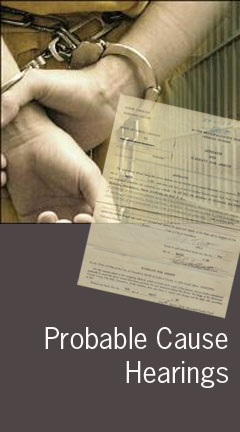Aviso de archivo
Esta es una página de archivo que ya no se actualiza. Puede contener información desactualizada y es posible que los enlaces ya no funcionen como se pretendía originalmente.
Home | Glossary | Resources | Help | Course Map
A preliminary or probable cause hearing is a process used by courts to ensure that a person is lawfully confined before the trial. When such hearings are ordered, affidavits may be admissible as supporting or additional evidence, along with live testimony.
In limited circumstances, attorneys may agree to use an expert witness's affidavit in lieu of their live testimony in the trial itself.
Example 1: When the attorneys for both sides in a dispute believe that the affidavit contains evidence they both want to rely upon but know that the expert will be unavailable on the most convenient trial date.
Example 2: When the expert witness is unexpectedly unable to appear because of a serious, unforeseen health problem.
When an expert provides an affidavit in a case, it is viewed by the courts as previously given, sworn testimony, albeit in document form. Consequently, as any witness may be questioned regarding their prior testimony, an expert witness may be impeached using the contents of his affidavit(s).
Evidence contained in a sworn affidavit provided by a forensic witness requires the same degree of accuracy and diligence as sworn testimony made by the witness in person during a deposition, hearing or trial.
Additional Online Courses
- What Every First Responding Officer Should Know About DNA Evidence
- Collecting DNA Evidence at Property Crime Scenes
- DNA – A Prosecutor’s Practice Notebook
- Crime Scene and DNA Basics
- Laboratory Safety Programs
- DNA Amplification
- Population Genetics and Statistics
- Non-STR DNA Markers: SNPs, Y-STRs, LCN and mtDNA
- Firearms Examiner Training
- Forensic DNA Education for Law Enforcement Decisionmakers
- What Every Investigator and Evidence Technician Should Know About DNA Evidence
- Principles of Forensic DNA for Officers of the Court
- Law 101: Legal Guide for the Forensic Expert
- Laboratory Orientation and Testing of Body Fluids and Tissues
- DNA Extraction and Quantitation
- STR Data Analysis and Interpretation
- Communication Skills, Report Writing, and Courtroom Testimony
- Español for Law Enforcement
- Amplified DNA Product Separation for Forensic Analysts


